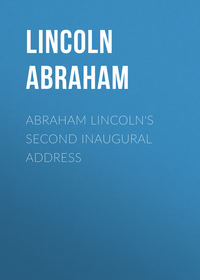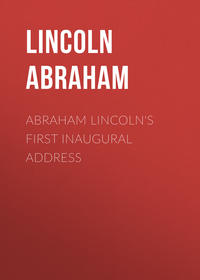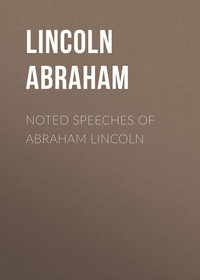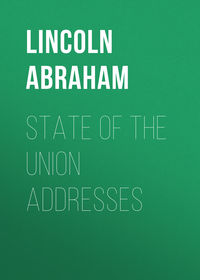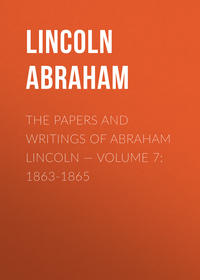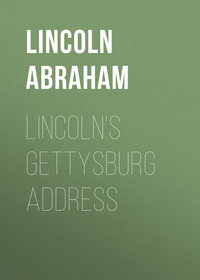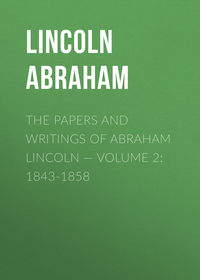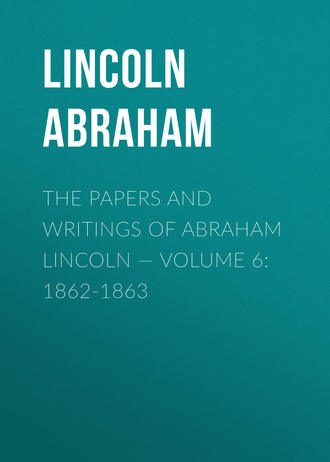 полная версия
полная версияThe Papers And Writings Of Abraham Lincoln — Volume 6: 1862-1863
A. LINCOLN.
P. S. General Pope thinks if you fall back it would be much better towards York River than towards the James. As Pope now has charge of the capital, please confer with him through the telegraph.
ORDER CONSTITUTING THE ARMY OF VIRGINIA
EXECUTIVE MANSION, WASHINGTON, D. C., June 26, 1862Ordered: 1st. The forces under Major-Generals Fremont, Banks, and McDowell, including the troops now under Brigadier-General Sturgis at Washington, shall be consolidated and form one army, to be called the Army of Virginia.
2d. The command of the Army of Virginia is specially assigned to Major-General John Pope, as commanding general. The troops of the Mountain Department, heretofore under command of General Fremont, shall constitute the First Army Corps, under the command of General Fremont; the troops of the Shenandoah Department, now under General Banks, shall constitute the Second Army Corps, and be commanded by him; the troops under the command of General McDowell, except those within the fortifications and city of Washington, shall form the Third Army Corps, and be under his command.
3d. The Army of Virginia shall operate in such manner as, while protecting western Virginia and the national capital from danger or insult, it shall in the speediest manner attack and overcome the rebel forces under Jackson and Ewell, threaten the enemy in the direction of Charlottesville, and render the most effective aid to relieve General McClellan and capture Richmond.
4th. When the Army of the Potomac and the Army of Virginia shall be in position to communicate and directly co-operate at or before Richmond, the chief command, while so operating together, shall be governed, as in like cases, by the Rules and Articles of War.
A. LINCOLN.
TELEGRAM FROM SECRETARY STANTON TO GENERAL H. W. HALLECK
WAR DEPARTMENT, June 28, 1862MAJOR-GENERAL HALLECK:
The enemy have concentrated in such force at Richmond as to render it absolutely necessary, in the opinion of the President, for you immediately to detach 25,000 of your force and forward it by the nearest and quickest route by way of Baltimore and Washington to Richmond. It is believed that the quickest route would be by way of Columbus, Ky., and up the Ohio River. But in detaching your force the President directs that it be done in such a way as to enable you to hold your ground and not interfere with the movement against Chattanooga and East Tennessee. This condition being observed, the forces to be detached and the routes they are to be sent are left to your own judgment.
The direction to send these forces immediately is rendered imperative by a serious reverse suffered by General McClellan before Richmond yesterday, the full extent of which is not yet known.
You will acknowledge the receipt of this despatch, stating the day and hour it is received, and inform me what your action will be, so that we may take measures to aid in river and railroad transportation.
EDWIN M. STANTON, Secretary of War.
TELEGRAMS TO GENERAL A. E. BURNSIDE
WASHINGTON, June 28, 1862GENERAL BURNSIDE:
I think you had better go, with any reinforcements you can spare, to General McClellan.
A. LINCOLN.
WAR DEPARTMENT, June, 28, 1862
MAJOR-GENERAL BURNSIDE, Newbern:We have intelligence that General McClellan has been attacked in large force and compelled to fall back toward the James River. We are not advised of his exact condition, but the President directs that you shall send him all the reinforcements from your command to the James River that you can safely do without abandoning your own position. Let it be infantry entirely, as he said yesterday that he had cavalry enough.
EDWIN M. STANTON,
Secretary of War.
TELEGRAM TO GENERAL G. B. McCLELLAN
WAR DEPARTMENT, WASHINGTON CITY, June 28, 1862MAJOR-GENERAL McCLELLAN:
Save your army, at all events. Will send reinforcements as fast as we can. Of course they cannot reach you to-day, to-morrow, or next day. I have not said you were ungenerous for saying you needed reinforcements. I thought you were ungenerous in assuming that I did not send them as fast as I could. I feel any misfortune to you and your army quite as keenly as you feel it yourself. If you have had a drawn battle, or a repulse, it is the price we pay for the enemy not being in Washington. We protected Washington, and the enemy concentrated on you. Had we stripped Washington, he would have been upon us before the troops could have gotten to you. Less than a week ago you notified us that reinforcements were leaving Richmond to come in front of us. It is the nature of the case, and neither you nor the government is to blame. Please tell at once the present condition and aspect of things.
A. LINCOLN
TO SECRETARY SEWARD
EXECUTIVE MANSION, June 28, 1862HON. W. H. SEWARD.
MY DEAR SIR: — My view of the present condition of the war is about as follows:
The evacuation of Corinth and our delay by the flood in the Chickahominy have enabled the enemy to concentrate too much force in Richmond for McClellan to successfully attack. In fact there soon will be no substantial rebel force anywhere else. But if we send all the force from here to McClellan, the enemy will, before we can know of it, send a force from Richmond and take Washington. Or if a large part of the western army be brought here to McClellan, they will let us have Richmond, and retake Tennessee, Kentucky, Missouri, etc. What should be done is to hold what we have in the West, open the Mississippi, and take Chattanooga and East Tennessee without more. A reasonable force should in every event be kept about Washington for its protection. Then let the country give us a hundred thousand new troops in the shortest possible time, which, added to McClellan directly or indirectly, will take Richmond without endangering any other place which we now hold, and will substantially end the war. I expect to maintain this contest until successful, or till I die, or am conquered, or my term expires, or Congress or the country forsake me; and I would publicly appeal to the country for this new force were it not that I fear a general panic and stampede would follow, so hard it is to have a thing understood as it really is. I think the new force should be all, or nearly all, infantry, principally because such can be raised most cheaply and quickly.
Yours very truly,
A. LINCOLN.
TELEGRAM TO GENERAL J. A. DIX
WAR DEPARTMENT, WASHINGTON, D.C., June 28,1862GENERAL DIX:
Communication with McClellan by White House is cut off. Strain every nerve to open communication with him by James River, or any other way you can. Report to me.
A. LINCOLN.
TELEGRAM TO FLAG-OFFICER L. M. GOLDSBOROUGH
WASHINGTON, D.C., June 28, 1862FLAG-OFFICER GOLDS BOROUGH, Fort Monroe:
Enemy has cut McClellan's communication with White House, and is driving Stoneman back on that point. Do what you can for him with gunboats at or near that place. McClellan's main force is between the Chickahominy and the James. Also do what you can to communicate with him and support him there.
A. LINCOLN
To GOVERNOR MORTON
WAR DEPARTMENT, WASHINGTON, D.C. June 28, 1862GOVERNOR O. P. MORTON, Indianapolis, Ind:
Your despatch of to-day is just received. I have no recollection of either John R. Cravens or Cyrus M. Allen having been named to me for appointment under the tax law. The latter particularly has been my friend, and I am sorry to learn that he is not yours. No appointment has been or will be made by me for the purpose of stabbing you.
A. LINCOLN.
TELEGRAM TO SECRETARY SEWARD
WAR DEPARTMENT, June 29, 1862.6 P.MHON. WILLIAM H. SEWARD, Astor House, New York:
Not much more than when you left. Fulton of Baltimore American is now with us. He left White House at 11 A.M. yesterday. He conversed fully with a paymaster who was with Porter's force during the fight of Friday and fell back to nearer McClellan's quarters just a little sooner than Porter did, seeing the whole of it; stayed on the Richmond side of the Chickahominy over night, and left for White House at 5 A.M. Saturday. He says Porter retired in perfect order under protection of the guns arranged for the purpose, under orders and not from necessity; and with all other of our forces, except what was left on purpose to go to White House, was safely in pontoons over the Chickahominy before morning, and that there was heavy firing on the Richmond side, begun at 5 and ceased at 7 A.M. Saturday. On the whole, I think we have had the better of it up to that point of time. What has happened since we still know not, as we have no communication with General McClellan. A despatch from Colonel Ingalls shows that he thinks McClellan is fighting with the enemy at Richmond to-day, and will be to-morrow. We have no means of knowing upon what Colonel Ingalls founds his opinion. Confirmed about saving all property. Not a single unwounded straggler came back to White House from the field, and the number of wounded reaching there up to 11 A.M. Saturday was not large.
A. LINCOLN.
To what the President has above stated I will only add one or two points that may be satisfactory for you to know.
First. All the sick and wounded were safely removed
Second. A despatch from Burnside shows that he is from White House; not a man left behind in condition to afford efficient support, and is probably doing so.
Third. The despatch from Colonel Ingalls impresses me with the conviction that the movement was made by General McClellan to concentrate on Richmond, and was successful to the latest point of which we have any information.
Fourth. Mr. Fulton says that on Friday night, between twelve and one o'clock, General McClellan telegraphed Commodore Goldsborough that the result of the movement was satisfactory to him.
Fifth. From these and the facts stated by the President, my inference is that General McClellan will probably be in Richmond within two days.
EDWIN M. STANTON, Secretary of War.
[Unfortunately McClellan did not do any of the things he was ordered, and that it was very likely possible to do. It is still some mystery what he was doing all these days other than hiding in the woods and staying out of communication so he would not receive any more uncomfortable orders. This was another place where the North was close to wining the war and did not. D.W.]
TELEGRAM TO SECRETARY SEWARD. WAR DEPARTMENT, June 30, 1862
HON. WM. H. SEWARD, New York:We are yet without communication with General McClellan, and this absence of news is our point of anxiety. Up to the latest point to which we are posted he effected everything in such exact accordance with his plan, contingently announced to us before the battle began, that we feel justified to hope that he has not failed since. He had a severe engagement in getting the part of his army on this side of the Chickahominy over to the other side, in which the enemy lost certainly as much as we did. We are not dissatisfied with this, only that the loss of enemies does not compensate for the loss of friends. The enemy cannot come below White House; certainly is not there now, and probably has abandoned the whole line. Dix's pickets are at New Kent Court-House.
A. LINCOLN.
CALL FOR TROOPS. NEW YORK, June 30, 1862
TO THE GOVERNORS OF THE SEVERAL STATES:The capture of New Orleans, Norfolk, and Corinth by the national forces has enabled the insurgents to concentrate a large force at and about Richmond, which place we must take with the least possible delay; in fact, there will soon be no formidable insurgent force except at Richmond. With so large an army there, the enemy can threaten us on the Potomac and elsewhere. Until we have re-established the national authority, all these places must be held, and we must keep a respectable force in front of WASHINGTON. But this, from the diminished strength of our army by sickness and casualties, renders an addition to it necessary in order to close the struggle which has been prosecuted for the last three months with energy and success. Rather than hazard the misapprehension of our military condition and of groundless alarm by a call for troops by proclamation, I have deemed it best to address you in this form. To accomplish the object stated we require without delay 150,000 men, including those recently called for by the Secretary of War. Thus reinforced our gallant army will be enabled to realize the hopes and expectations of the government and the people.
A. LINCOLN.
TELEGRAM TO GENERAL J. A. DIX
WAR DEPARTMENT, WASHINGTON CITY, June 30, 1862MAJOR-GENERAL Dix, Fort Monroe:
Is it not probable that the enemy has abandoned the line between White House and McClellan's rear? He could have but little object to maintain it, and nothing to subsist upon. Would not Stoneman better move up and see about it? I think a telegraphic communication can at once be opened to White House from Williamsburg. The wires must be up still.
A. LINCOLN.
TELEGRAMS TO GENERAL H. W. HALLECK
WAR DEPARTMENT, JUNE 30, 1862. 3 P. MMAJOR-GENERAL HALLECK, Corinth:
Your telegram of this date just received. The Chattanooga expedition must not on any account be given up. The President regards that and the movement against East Tennessee as one of the most important movements of the war, and its occupation nearly as important as the capture of Richmond. He is not pleased with the tardiness of the movement toward Chattanooga, and directs that no force be sent here if you cannot do it without breaking up the operations against that point and East Tennessee. Infantry only are needed; our cavalry and artillery are strong enough. The first reports from Richmond were more discouraging than the truth warranted. If the advantage is not on our side, it is balanced. General McClellan has moved his whole force on the line of the James River, and is supported there by our gunboats; but he must be largely strengthened before advancing, and hence the call on you, which I am glad you answered so promptly. Let me know to what point on the river you will send your forces, so as to provide immediately for transportation.
EDWIN M. STANTON,
Secretary of War.
WASHINGTON, D.C., June 30, 1862
MAJOR-GENERAL HALLECK, Corinth, Mississippi:Would be very glad of 25,000 infantry; no artillery or cavalry; but please do not send a man if it endangers any place you deem important to hold, or if it forces you to give up or weaken or delay the expedition against Chattanooga. To take and hold the railroad at or east of Cleveland, in East Tennessee, I think fully as important as the taking and holding of Richmond.
A. LINCOLN.
CALL FOR 300,000 VOLUNTEERS, JULY 1, 1862
June 28, 1861The undersigned, governors of States of the Union, impressed with the belief that the citizens of the States which they respectively represent are of one accord in the hearty desire that the recent successes of the Federal arms may be followed up by measures which must insure the speedy restoration of the Union, and believing that, in view of the present state of the important military movements now in progress, and the reduced condition of our effective forces in the field, resulting from the usual and unavoidable casualties in the service, the time has arrived for prompt and vigorous measures to be adopted by the people in support of the great interests committed to your charge, respectfully request, if it meets with your entire approval, that you at once call upon the several States for such number of men as may be required to fill up all military organizations now in the field, and add to the armies heretofore organized such additional number of men as may, in your judgment, be necessary to garrison and hold all the numerous cities and military positions that have been captured by our armies, and to speedily crush the rebellion that still exists in several of the Southern States, thus practically restoring to the civilized world our great and good government. All believe that the decisive moment is near at hand, and to that end the people of the United States are desirous to aid promptly in furnishing all reinforcements that you may deem needful to sustain our government.
ISRAEL WASHBURN, JR., Governor of Maine.
H. S. BERRY, Governor of New Hampshire.
FREDERICK HOLBROOK, Governor of Vermont.
WILLIAM A. BUCKINGHAM, Governor of Connecticut.
E. D. MORGAN, Governor of New York.
CHARLES S. OLDEN, Governor of New Jersey.
A. G. CURTIN, Governor of Pennsylvania.
A. W. BRADFORD, Governor of Maryland.
F. H. PIERPOINT, Governor of Virginia.
AUSTIN BLAIR, Governor of Michigan.
J. B. TEMPLE, President Military Board of Kentucky.
ANDREW JOHNSON, Governor of Tennessee.
H. R. GAMBLE, Governor of Missouri.
O. P. MORTON, Governor of Indiana.
DAVID TODD, Governor of Ohio.
ALEXANDER RAMSEY, Governor of Minnesota.
RICHARD YATES, Governor of Illinois.
EDWARD SALOMON, Governor of Wisconsin.
THE PRESIDENT
EXECUTIVE MANSION, WASHINGTON, July 1, 1862
GENTLEMEN: — Fully concurring in the wisdom of the views expressed to me in so patriotic a manner by you, in the communication of the twenty-eighth day of June, I have decided to call into the service an additional force of 300,000 men. I suggest and recommend that the troops should be chiefly of infantry. The quota of your State would be — . I trust that they may be enrolled without delay, so as to bring this unnecessary and injurious civil war to a speedy and satisfactory conclusion. An order fixing the quotas of the respective States will be issued by the War Department to-morrow.
A. LINCOLN.
PROCLAMATION CONCERNING TAXES IN REBELLIOUS STATES, JULY 1, 1862
BY THE PRESIDENT OF THE UNITED STATES OF AMERICA:A Proclamation.
Whereas in and by the second section of an act of Congress passed on the 7th day of June, A. D. 1862, entitled "An act for the collection of direct taxes in insurrectionary districts within the United States, and for other purposes," it is made the duty of the President to declare, on or before the first day of July then next following, by his proclamation, in what States and parts of States insurrection exists:
Now, therefore, be it known that I, Abraham Lincoln, President of the United States of America, do hereby declare and proclaim that the States of South Carolina, Florida, Georgia, Alabama, Louisiana, Texas, Mississippi, Arkansas, Tennessee, North Carolina, and the State of Virginia except the following counties-Hancock, Brooke, Ohio, Marshall, Wetzel, Marion, Monongalia, Preston, Taylor, Pleasants, Tyler, Ritchie, Doddridge, Harrison, Wood, Jackson, Wirt, Roane, Calhoun, Gilmer, Barbour, Tucker, Lewis, Braxton, Upsbur, Randolph, Mason, Putnam, Kanawha, Clay, Nicholas, Cabell, Wayne, Boone, Logan, Wyoming, Webster, Fayette, and Raleigh-are now in insurrection and rebellion, and by reason thereof the civil authority of the United States is obstructed so that the provisions of the "Act to provide increased revenue from imports, to pay the interest on the public debt, and for other purposes," approved August 5, 1861, can not be peaceably executed; and that the taxes legally chargeable upon real estate under the act last aforesaid lying within the States and parts of States as aforesaid, together with a penalty of 50 per centum of said taxes, shall be a lien upon the tracts or lots of the same, severally charged, till paid.
In witness whereof I have hereunto set my hand and caused the seal of the United States to be affixed.......
A. LINCOLN.
By the President: F. W. SEWARD, Acting Secretary of State.
MESSAGE TO CONGRESS, JULY 1, 1862
TO THE SENATE AND HOUSE OF REPRESENTATIVESI most cordially recommend that Captain Andrew H. Foote, of the United States Navy, receive a vote of thanks of Congress for his eminent services in Organizing the flotilla on the western Waters, and for his gallantry at Fort Henry, Fort Donelson, Island Number Ten, and at various other places, whilst in command of the naval forces, embracing a period of nearly ten months.
A. LINCOLN.
WASHINGTON, D. C. July 1, 1862
TELEGRAM TO GENERAL McCLELLAN
WASHINGTON, JULY 1,1862. 3.30 P.MMAJOR-GENERAL GEORGE B. McCLELLAN:
It is impossible to reinforce you for your present emergency. If we had a million of men, We could not get them to you in time. We have not the men to send. If you are not strong enough to face the enemy, you must find a place of security, and wait, rest, and repair. Maintain your ground if you can, but save the army at all events, even if you fall back to Fort Monroe. We still have strength enough in the country, and will bring it out.
A. LINCOLN.
TO GENERAL G. B. McCLELLAN
WAR DEPARTMENT, WASHINGTON, D.C., July 2, 1862MAJOR-GENERAL McCLELLAN:
Your despatch of Tuesday morning induces me to hope your army is having some rest. In this hope allow me to reason with you a moment. When you ask for 50,000 men to be promptly sent you, you surely labor under some gross mistake of fact. Recently you sent papers showing your disposal of forces made last spring for the defense of WASHINGTON, and advising a return to that plan. I find it included in and about WASHINGTON 75,000 men. Now, please be assured I have not men enough to fill that very plan by 15,000. All of Fremont's in the valley, all of Banks's, all of McDowell's not with you, and all in WASHINGTON, taken together, do not exceed, if they reach, 60,000. With Wool and Dix added to those mentioned, I have not, outside of your army, 75,000 men east of the mountains. Thus the idea of sending you 50,000, or any other considerable force, promptly, is simply absurd. If, in your frequent mention of responsibility, you have the impression that I blame you for not doing more than you can, please be relieved of such impression. I only beg that in like manner you will not ask impossibilities of me. If you think you are not strong enough to take Richmond just now, I do not ask you to try just now. Save the army, material and personal, and I will strengthen it for the offensive again as fast as I can. The governors of eighteen States offer me a new levy of 300,000, which I accept.
A. LINCOLN.
TELEGRAM TO GENERAL H. W. HALLECK
WASHINGTON, D.C. July 2, 1862MAJOR-GENERAL HALLECK, Corinth, Mississippi:
Your several despatches of yesterday to Secretary of War and myself received. I did say, and now repeat, I would be exceedingly glad for some reinforcements from you. Still do not send a man if in your judgment it will endanger any point you deem important to hold, or will force you to give up or weaken or delay the Chattanooga expedition.


